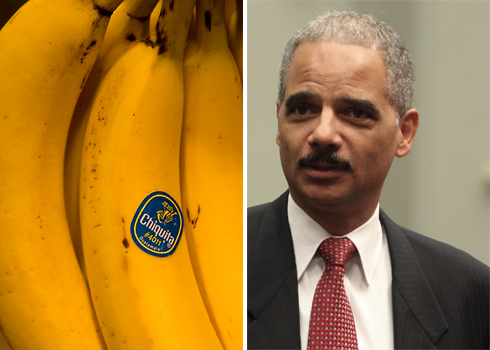Denise Cheung has one of the toughest jobs in the Justice Department: Attorney General Eric Holder’s top national security adviser.
For five years before she took the job advising Holder, Cheung was investigating and prosecuting cases related to terrorist attacks abroad, violations of export sanctions, material support to terrorists, presidential threats and espionage during her tenure in the National Security Section of the D.C. federal prosecutor’s office.
Her legal opponent for one of those terrorism funding cases: her now-boss, Attorney General Eric Holder.
Holder had finished up his time as Deputy Attorney General in 2001 (following a stint as U.S. Attorney for D.C. from 1993-1997) and was in private practice at Covington & Burling when he squared off with Cheung. He represented banana giant Chiquita International in negotiations with the DOJ that ended in a settlement in 2007, years after the company was accused of funneling money to a Colombian paramilitary group from 1997-2004.
That group, the United Self-Defense Forces of Colombia (known by the Spanish acronym AUC) was described by the U.S. as a violent, right-wing terrorist organization. It was eventually designated as a Foreign Terrorist Organization the day before the Sept. 11, 2001 attacks and as a Specially-Designated Global Terrorist in October of that year, making Chiquita’s payments even more problematic for the company than before. Chiquita had been making “security payments” or payments for “security” or “security services” to the AUC since 1997, according to the feds.
Harvard Law School alumna Cheung was one of several prosecutors working on the case against Chiquita, which ultimately resulted in several stiff penalties — including a $25 million fine .
What made the case even more tricky was the fact that a lawyer for Chiquita had, back in 2003, actually disclosed to the Justice Department that the company was paying “protection money” to the paramilitary group. That disclosure, the Washington Post reported, was made to then-assistant attorney general for national security (and future Homeland Security Secretary) Michael Chertoff by his former law firm colleague Roderick M. Hills.
Outside counsel had told Chiquita they couldn’t make the payments. But Hills wanted Chertoff’s advice. What happened during the meeting was then in dispute, but sources close to the company told the newspaper in 2007 that neither Chertoff nor a deputy attorney general they sought out ever got back to the company or their lawyers. Chiquita made the payments for nearly a year following the meeting.
DOJ said in a press release at the time of the guilty plea that officials at the Justice Department had “acknowledged that the issue of continued payments was complicated,” but said Chertoff and others made clear the payments were illegal and could not continue.
Holder was upset that DOJ was going after Chiquita so aggressively, according to the 2007 Washington Post article. He was concerned that even though the company chose the difficult path, they were still facing the possibility of prosecution.
“If what you want to encourage is voluntary self-disclosure, what message does this send to other companies?” asked Holder. “Here’s a company that voluntarily self-discloses in a national security context, where the company gets treated pretty harshly, [and] then on top of that, you go after individuals who made a really painful decision.”
The Justice Department did not respond to requests for comment regarding Holder’s or Cheung’s work on the Chiquita case. They’re not likely to want to remind people that Holder represented a company that paid off a terrorist organization, even if that client is a household name — especially when the Attorney General is a top target for incoming House Republicans.
Cheung has been the Attorney General’s top adviser on issues of national security since August, when Amy Jeffress left the position to take a gig as the Justice Department Attaché at the U.S. Embassy in London. Together former opponents Cheung and Holder face a looming number of national security decisions on the horizon along with an adversarial House Judiciary Committee.









